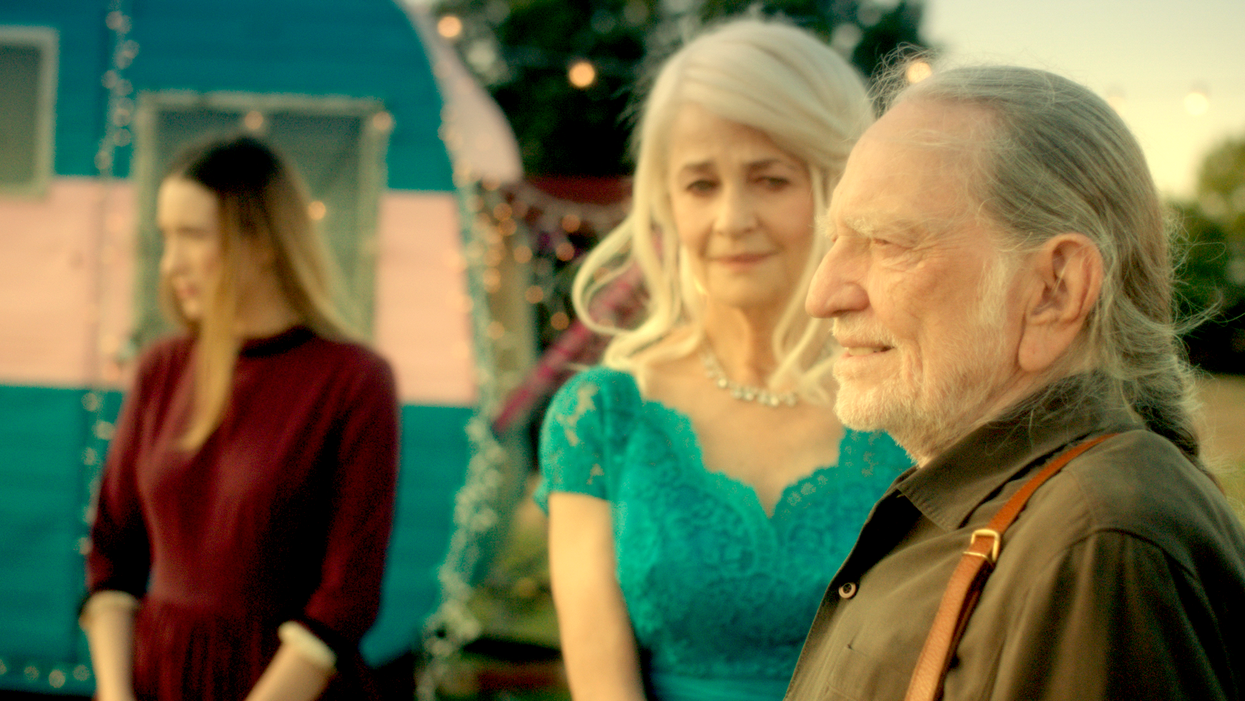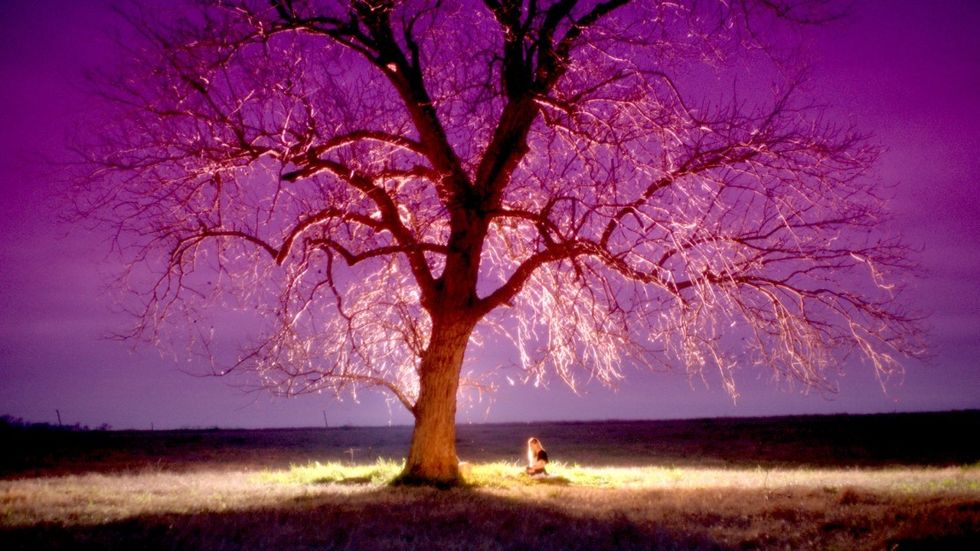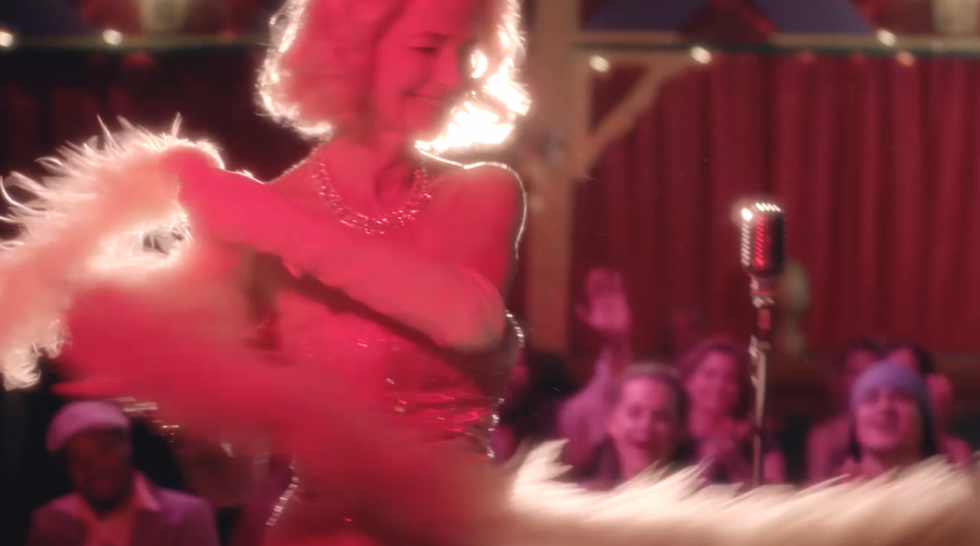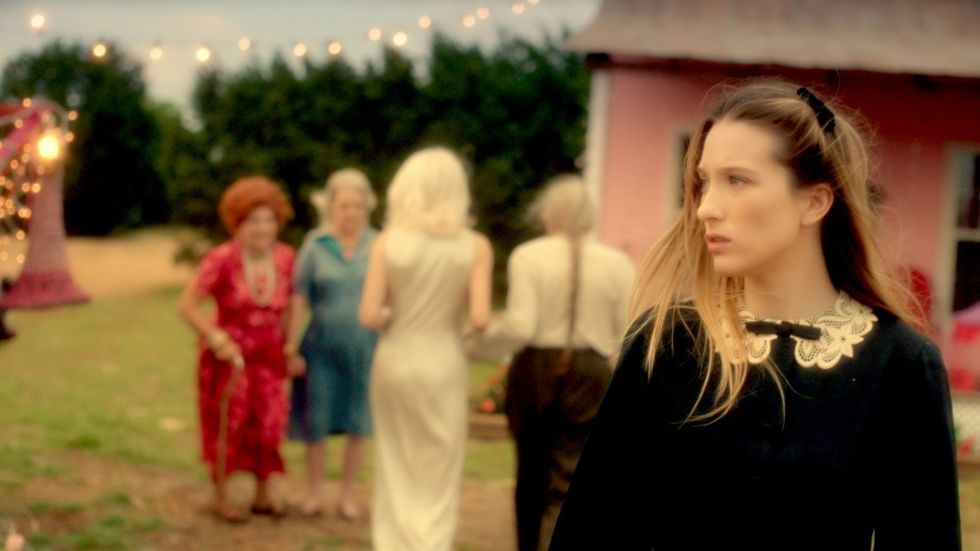'Waiting for the Miracle to Come': How Willie Nelson's Ranch Inspired a Dream of Love and Loss
You never know who might appear on Willie's ranch.

Shortly after the death of her father, Adeline discovers a note from him directing her to seek out a gold mine on a distant ranch. Instead, Adeline discovers The Beautiful Place, the home of two retired vaudeville stars and a monument to their time in entertainment. What starts a chance encounter, seemingly a mistake on Adeline's part, turns into a friendship that soon goes much deeper in this mystical tale.
Waiting for the Miracle to Come premiered at the Austin Film Festival in the Texas Independent Features this weekend and screens again tonight, Mon. Oct. 29. Before the festival, No Film School interviewed writer/director Lian Lunson about her feature film, discovering how her work in music documentaries prepared her for her first narrative feature film, how Willie Nelson and his ranch Luck, Texas set the stage for the story, and how Wim Wenders mentored her through the process.
No Film School: What was your inspiration for Waiting for the Miracle to Come?
Lian Lunson: Willie Nelson, mainly. I wrote this piece for him. It's quite different because I see him as being quite different as a human being. He's sort of a mythological figure, a warrior. I had started to write this script a long time ago when I filmed a documentary out at Willie's ranch where he had built this town for Red Headed Stranger. It's just a magical place. It's just got an energy about it. I had to create some fantasy, magic realism sort of world in order to make it work so I could really shoot it at his ranch.
NFS: You have Willie in mind, you have his ranch as a key setting that inspires you. How does that lead you to the story that you ultimately told?
Lunson: I think that I've always seen Willie Nelson as this great connector. He really connects to people. The idea of connection has always been really important to me, personally. I wanted to create a film about connections and also explore the grieving process of life after death and opportunities that open up in a metaphysical way. I really think of Willie Nelson as a forward thinker, he's always ahead of the game or has been in metaphysics and all of the thought forms he has. I think the story sort of started out with the connection between families and human beings, through life and through death.

Lunson: I grew up watching independent and experimental films. They were always really different and weren't really streamlined, but they really gave you things to think about, particularly the filmmaker. They had ideas in them that you could go away and talk about. I was really drawn to that. It's really hard these days to make a film like that because audiences today aren't standing in line to watch foreign films and great independent films. I hope that comes back.
I've always been a huge fan Terrence Malick and Wim Wenders, particularly Wim Wenders films, they are sort of fantastical in a way. I was always drawn to that sort of very dreamy type quality of film, something you could disappear into. There's so much of a harsh reality out there now. I'm always a fan of old movies and escaping into different worlds. I hope that there's still an audience for that somewhere.
NFS: You mentioned Wim Wenders. He's one of the executive producers on your film, and you've worked with him before. How did you and Wim Wenders cross paths originally, and how did he help you with this project specifically?
Lunson: Well, interestingly enough, many years ago I took Bono to see Wings of Desire, and he became a big Wim Wenders fan. Then Bono eventually introduced me to Wim Wenders, and Wim has been involved in all of my projects, really. My first stab at directing, he was in the edit room, and for pretty much everything I have ever done. He really helped me get this film made. It was imperative. I mean, I don't think I would have gotten this film made at all without him. Given the subject and the cast. People don't think of Willie so much as an actor these days. It was really Wim's support as well as Bono that really helped me get it made. Wim has been a huge influence on me.
"I think that there's a certain element of magic that opens up in the film world when you think on your feet a little bit more. Everything is not set in stone."
NFS: Your previous work has been in music documentaries. We've already talked about your work with Willie Nelson. You also made the doc Leonard Cohen: I'm Your Man. How did your experiences creating those documentaries and the lessons you learned translate into writing, directing and producing your first narrative feature film?
Lunson: I think that when you make documentary films, certainly the films that I have made which are music films, you've got to be open to a certain element of chance because you've got to think on your feet. You don't have a script, you've got to make all of this work whether you're shooting a concert film or interviews or whatever you're doing. And I think that there's a certain element of magic that opens up in the film world when you think on your feet a little bit more. Everything is not set in stone. And obviously it led me to making a film with Willie Nelson because of that music connection.
I had to shoot this film in 18 days, and the South by Southwest Festival was on, and Willie had a big event at his ranch during the music festival, and we were stuck in the middle of that. We really had to work around enormous obstacles to get this done. We'd be shooting one person's coverage one week, and we couldn't shoot the other person's coverage for ten days later because there was nothing behind them. We had broken scenes. There's lots of that sort of stuff where I feel like my work in the documentary world helped me. I was less panicked and able to think on my feet a little bit more.
NFS: You mentioned at the beginning that you were inspired by Willie Nelson and who he was as a person to craft this story. When did Charolotte Rampling come into the picture, and, how did she affect the story that you were trying to tell?
Lunson: Well, I mean, I had been a massive Charlotte Rampling fan since Georgy Girl, and in Australia the British films that she did were far more significant there than here [in the U.S.]. And, so I had always been a massive fan. I wanted to pair Willie Nelson with someone who was a really great actor and who had their own credibility in the independent film world. Charlotte Rampling has been a sort of pioneer for women because she has completely done what she has wanted to do based on story, not what was good for her career. She champions new film makers. She's taken risks, and this was a risk for somebody of her age as well, to jump in and do what she did.
It was a dream come true, and I think she was really drawn to this project because of Willie Nelson as well. She really jumped at the opportunity to work with him. That was the spirit that I was looking for in the partner for Willie. And Charlotte, she really made it about him. We all did. That's what was so lovely and generous about the way the cast was, everybody was sort of there shooting for him, and she was very much a part of that.

Lunson: I did a documentary with Willie in the '90s where I shot everything at the ranch, and it was a dream to be there. The town Luck, Texas had been built for the movie Red Headed Stranger based on Willie's album, which was extraordinary--that Willie Nelson would build a town on his property for a movie set and then just leave it there and have it function as an actual town. You know what I mean? The opera house to watch the shows in, to the world headquarters at the end of the street where he hung out. He'd go to church on Sundays at the church in town. So it was a functioning town that was just very different, you couldn't separate it from Willie Nelson. The town is legendary along with him.
The dream to immortalize that town again in this film because the town had had such an impression on me. I was inspired by the town to write this story. This is where I got the ideas about the story when I was shooting there in the '90s. It's lovely to be there. Like when I was shooting on Easter Sunday, they had mass at the church. Just to see the church filled with people and people in the streets. It's just a magnificent place, so the idea that you'd get to shoot there and create a world there. I mean, my film has a big fantasy element built around that place so I could make it work. How do you shoot a contemporary film in a tabloid town, so to speak?
NFS: One of the things that is interesting about the film is because of its dreamlike quality and the choices you make in terms of wardrobe, vehicles, and setting, the film seems a bit out of time. It doesn't feel like it fits necessarily in any one particular time. Was that intentional?
Lunson: That was very intentional. The film is supposed to be timeless so that when people are watching the film, they have no idea what period it is set in. Often when you watch a film, and it is really given what the time is, you go to that mode of thinking of that particular time. And to capture the dreamlike suspense in time, whether this was really happening or it was an unreal world, was to make the film timeless so that people had no idea what period it was set in because I think the story line, for me, was a timeless story. Connections between human beings are really timeless.

Lunson: I just hope that they connect to the characters and they also think about their own connections with families, and are inspired to think of some of these ideas that are touched upon in the film. We all lose people, we all grieve, and I think that there's a ray of light, and that can change people, you know? Even if we lose people we love, there's a possibility that their loss opens up a new pathway for you if you are open to it. That's a big part of metaphysics, and I hope that people take something like that away from it that inspires them.
Also, I hope it deepens their appreciation for Willie Nelson as an actor. That was one of my main goals, to really show people how great he is. He's extraordinary.
'Waiting for the Miracle to Come' screens tonight, Mon. Oct. 29 at the Austin Film Festival at 7 pm at the Galaxy Highland.











